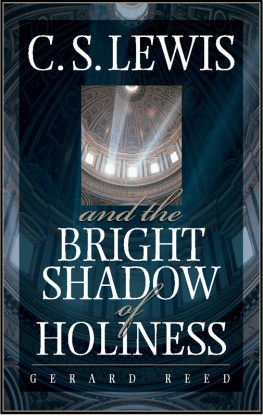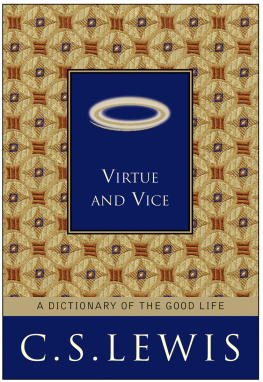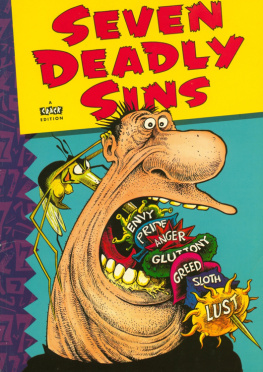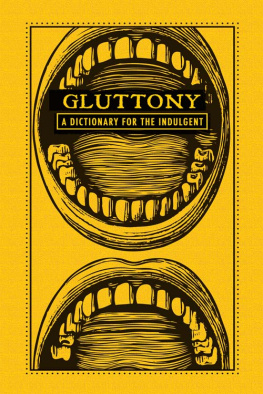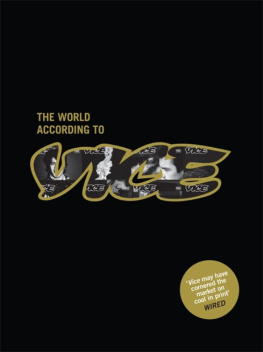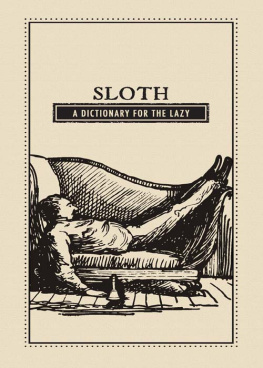Copyright 2001
by Beacon Hill Press of Kansas City
All rights reserved. No part of this publication may be reproduced or transmitted in any form or by any meanselectronic, mechanical, or any otherexcept for brief quotations in printed reviews, without the prior written permission of the publisher. If you have received this publication from any source other than an online bookstore, youve received a pirated copy. Please contact us at the Nazarene Publishing House and notify us of the situation.
2014 eISBN 978-0-8341-3442-3
Printed in the
United States of America
Cover Design: Ted Ferguson
All Scripture quotations not otherwise designated are from the Holy Bible, New International Version (NIV). Copyright 1973, 1978, 1984 by International Bible Society. Used by permission of Zondervan Publishing House. All rights reserved.
Permission to quote from the following additional versions of the Bible is acknowledged with appreciation:
The New King James Version (NKJV). Copyright 1979, 1980, 1982 Thomas Nelson, Inc.
The Revised Standard Version (RSV) of the Bible, copyright 1946, 1952, 1971 by the Division of Christian Education of the National Council of the Churches of Christ in the USA.
The Living Bible (TLB), 1971. Used by permission of Tyndale House Publishers, Inc., Wheaton, IL 60189. All rights reserved.
Scripture quotations marked KJV are from the King James Version.
Library of Congress Cataloging-in-Publication Data
Reed, Gerard.
C. S. Lewis explores vice and virtue / Gerard Reed.
p. cm.
Includes bibliographical references.
ISBN 0-8341-1894-7
1. Deadly sins. 2. Cardinal virtues. 3. Lewis, C. S. (Clive Staples), 1898-1963. I. Title.
BV4626 .R44 2001
241'.3dc21
2001025401
To my students at Southern Nazarene University, MidAmerica Nazarene University, and Point Loma Nazarene University, who over many years have challenged and blessed me by granting me the privilege of serving as their professor.
Contents
PART ONE
The Seven Deadly Sins
1. Pride
The Complete Anti-God State of Mind
2. Envy
The Most Odious of Vices
3. Anger
The Anesthetic of the Mind
4. Lust
Perversions of the Sex Instinct Are Numerous
5. Gluttony
Her Belly Dominates Her Whole Life
6. Sloth
This Made It Hard to Think
7. Avarice
This Itch to Have Things
PART TWO
The Seven Christian Virtues
8. Prudence
No Intellectual Slackers Allowed
9. Justice
The Old Name for Fairness
10. Courage
The Form of Every Virtue
11. Temperance
Going the Right Length
12. Faith
The Power to Go on Believing
13. Hope
Something That Cannot Be Had in This World
14. Love
An Affair of the Will
T HROUGHOUT THE LAST CENTURY, scores of analysts warned that Western civilization was collapsing like a wounded warrior before a resurgent barbarism. This stands revealed in such items as a controversial art exhibit in Brooklyn that featured animal parts in formaldehyde and a portrait of the Virgin Mary covered with elephant dung.
As a result, much has been written prescribing a restoration of traditional virtues. Underlying much of this is a pivotal work by one of the worlds finest ethicists, Alastair MacIntyre, who thinks the worlds fate, humanitys well-being, rests in the balance. He suspects that our era resembles the era marking the transition from the ancient to the medieval world, an era of barbarism and darkness.
Evangelical theologian David Wells shares MacIntyres concern and addressed it in Losing Our Virtue: Why the Church Must Recover Its Moral Vision. He addresses the disintegrating moral culture in American society and what this now means for the Church,
Weve lost our moral compass. Wells says, Functionally, we are not morally disengaged, adrift, and alienated; we are morally obliterated. We are, in practice, not only moral illiterati; we have become morally vacant.
The classical spirituality that sustained earlier generations focused on Gods holiness. Love and compassion were highlighted within the context of Gods character: holiness. Conforming to the truth, becoming holy, was the believers true vocation. But few churches today stress holiness. Doctrines such as Gods wrath, judgment, and moral requirements remain unmentioned lest they offend folks in the pews.
Tolerance, an essentially pagan virtue, has been deftly interwoven into Christian thought (edging aside forgiveness) and has been elevated into the central mark of goodness. Almighty God is often portrayed as a forever forgiving, perennially permissive Abba who demands nothing from His children.
As a result, sin is defined in psychological rather than ethical termsits a problem we have dealing with ourselves rather than God. Sin is wrong, were told, because it harms usnot because it offends God. So we rarely repent of our transgressions. Instead, we admit our inner turmoil, reveal our problems and frustrations, and imagine that God is a loving psychic healer anxious to comfort us. Self-sacrifice has been discarded in favor of self-realization. Self-denial and self-discipline have been storehoused so that physical and psychological health can be marketed.
While Wellss litany about our predicament might tempt us to despair, he proposes two remedies. First, we must proclaim the truth about sin. Without an understanding of sinsin understood within a powerfully conceived moral vision of realitythere can be no deep believing of the Gospel. This, then, is not an optional task but an essential and inescapable one.
Second, the Church must clean house. Christians must be virtuous, holy people. The world simply dismisses much of the God talk that pervades the airwaves. Evangelicals, especially, must live ethically. And this is possible within the provisions of grace. Scripture is clear in its teaching that the old man, who has lived comfortably in the fallen world, must die with its entire understanding of the self and its relationship to God, if the new man is to emerge in Christ.
So the Church must preach the Word. The Word, however, is not simply an announcement that all is forgiven. It calls us to repentance, to holiness. We can be redeemed only as we recover the deeply moral truth found in the Word. And only as we are redeemed and live the moral implications of that redemption can we offer hope and guidance to a world in chaos.
In The Death of Character, James Davison Hunter adds important data to MacIntyres indictment. Character in America has collapsed, he thinks, because the dogmatic creeds undergirding it have been discarded. The theological foundation, the religious worldview, that made possible the cultivation of moral character no longer shapes Americas culture. Were suffocating in the spineless slime left by earlier generations; We want the flower of moral seriousness to blossom, but we have pulled the plant up by its roots.
Revealingly, we hear much talk about the need for values, the restoration of values. But values are human measures we place on thingsjust as we price goods in the grocery store. Values are truths that have been deprived of their commanding character. They are substitutes for revelation, imperatives that have dissolved into a range of possibilities. The very word value signifies the reduction of truth to utility, taboo to fashion, conviction to mere preference; all provisional, all exchangeable. Both values and lifestylea way of living that reflects that accumulation of ones valuesbespeak a world in which nothing is sacred.


